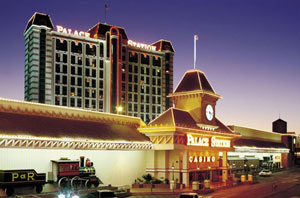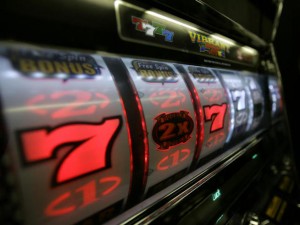After reaching a fragile labor peace with Station Casinos, the Culinary Union is heading for another scrum with the company, publishing a petition to “Stations Casino” [sic!], detailing various and sundry workplace complaints, such as “first aid supplies were not easily available at work.” The petition concludes that “based on focus group  and survey data collected from 61 workers at Station Casinos’ properties in 2015″ there exists “a grim picture of work conditions related to employee health and safety risks” This summation was ratified by workers such as Palace Station cook Adolfo Gaspar, who told the Culinary, “We have been understaffed for the last six to seven years and they don’t train people properly. The pots and pans are regularly dirty so I have to work extra hard to clean everything before I can cook, which adds a lot of stress to my job.”
and survey data collected from 61 workers at Station Casinos’ properties in 2015″ there exists “a grim picture of work conditions related to employee health and safety risks” This summation was ratified by workers such as Palace Station cook Adolfo Gaspar, who told the Culinary, “We have been understaffed for the last six to seven years and they don’t train people properly. The pots and pans are regularly dirty so I have to work extra hard to clean everything before I can cook, which adds a lot of stress to my job.”
That’s basically the short version of a long litany of complaints. The study was commissioned by the Culinary, so that must be taken into account with regard to its findings. It accused Station of short-staffing, forcing workers to skip lunch breaks to fill their work quota for the day and of rival workers “being more likely to obtain health insurance that is paid for by employers, and being more likely to be covered under their employer’s pension plans. The petition was signed by myriad health, workplace-safety and academic professionals. Station hasn’t commented yet and probably won’t, but this presages another round of hardball as the Culinary tries to unionize Station properties, one by one.
* With pro-casino forces gaining ground in Georgia (and newly complicated by the Neetoowah Band of Cherokee) it was only a matter of time before South Carolina began debating the issue. The Palmetto State already plays home to “cruises to nowhere” out of Myrtle Beach. The pro-casino push is going to be starchly opposed by movement conservatives and the churchy set alike. However, South Carolina has a crumbling highway system, the education lottery has been a flop and there’s at least a $20 billion arrearage in the state’s pension plan. In addition to Myrtle Beach, advocates are plumping for sites near Charlotte, North Carolina, and Savannah, Georgia. However, they’ll have to deal with the likes of likes of Myrtle Beach Chamber of Commerce Chairman Brad Dean, who says, “South Carolina’s  roads are in terrible shape, and we desperately need sustainable infrastructure funding. But the idea of building a casino in Myrtle Beach to help fund statewide road improvements is not a solution.”
roads are in terrible shape, and we desperately need sustainable infrastructure funding. But the idea of building a casino in Myrtle Beach to help fund statewide road improvements is not a solution.”
“If this state was operated like a business, we would have had casinos years ago. What we’ve got to do is make sure we’re not leaving money on the table,” responds State House Minority Leader Todd Rutherford (D), point man on the casino legislation. At least the people are behind him … maybe. A poll shows them favoring casinos over higher gas taxes 58% to 26%, but an earlier poll showed them deadlocked on casinos, with 47% and an equal percentage against. There’ll have to be dramatic movement in Georgia to break the South Carolina deadlock.
* Kirk Kerkorian may be gone but his Tracinda Corp. continues to play a major role within MGM Resorts International. It has struck a deal with UBS for the latter to buy as much as 20 million shares over a two-week deal. The agreement is expected to net Tracinda as much as $521 million, provided UBS buys the entire tranche and the stock price stays high.
* Tropicana Entertainment‘s Lumiere Place had its clock cleaned — as did several other St. Louis casinos — by a slot cheat armed with little more than a smart phone. Murat Bliev assiduously studied slot machines’ inner workings, achieving “improbably  large” winnings from Novomatic slots in Europe. Bliev had cracked the code of the pseudo random number generators which determine slot payouts. The key was to find the “seed” that makes the outcome appear truly random. “So even if they understand how a machine’s PRNG functions, hackers would also have to analyze the machine’s gameplay to discern its pattern,” writes Wired magazine. According to an accomplice who was apprehended at Pechanga Resort & Casino, the hackers recorded 24 spins per machine. Those were analyzed by co-conspirators in St. Petersburg, who would transmit signals to the players when they should hit “spin.” To minimize exposure to law enforcement, Bliev led multi-man teams to the casino they intended to hit. Bliev and two accomplices were busted at Hollywood St. Louis, while a fourth has been turned and is cooperating with U.S. authorities.
large” winnings from Novomatic slots in Europe. Bliev had cracked the code of the pseudo random number generators which determine slot payouts. The key was to find the “seed” that makes the outcome appear truly random. “So even if they understand how a machine’s PRNG functions, hackers would also have to analyze the machine’s gameplay to discern its pattern,” writes Wired magazine. According to an accomplice who was apprehended at Pechanga Resort & Casino, the hackers recorded 24 spins per machine. Those were analyzed by co-conspirators in St. Petersburg, who would transmit signals to the players when they should hit “spin.” To minimize exposure to law enforcement, Bliev led multi-man teams to the casino they intended to hit. Bliev and two accomplices were busted at Hollywood St. Louis, while a fourth has been turned and is cooperating with U.S. authorities.
Despite this setback the St. Petersburg is continuing its activities and recently made a successful sneak attack in Peru. Also, the house has decided it doesn’t always need to win: “as long as older, compromised machines are still popular with customers, the smart financial move for casinos is to keep using them and accept the occasional loss to scammers,” Wire concludes.
* Despite opting for a soft opening, del Lago Resort & Casino is off to a fast start, averaging win/slot/day of $252, well above industry average.

